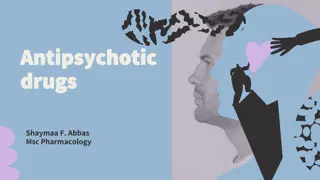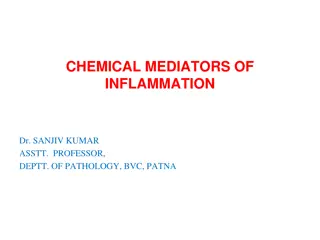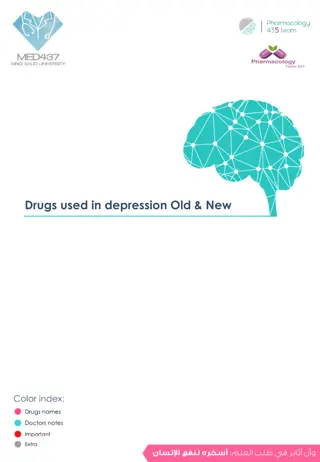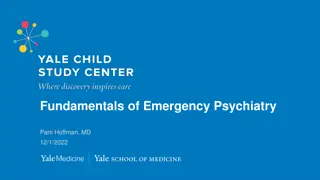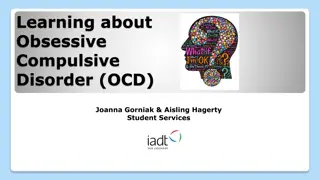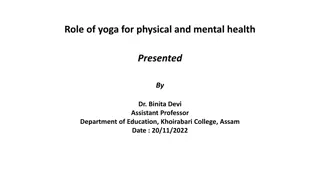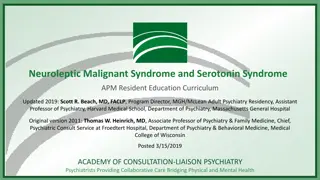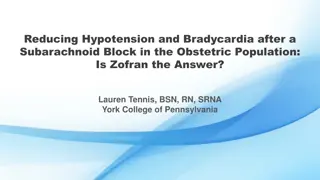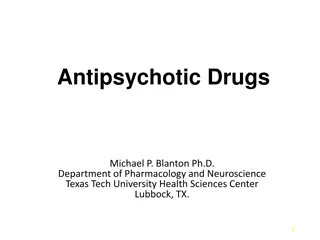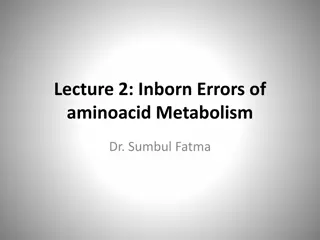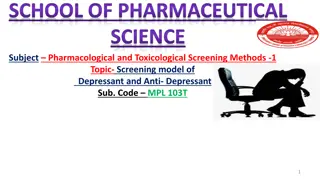Neurologic Disorder
Structural divisions of the central and peripheral nervous systems, learn about neuron anatomy, the neuromuscular junction, and the role of neurotransmitters. Includes information on Acetylcholine, Norepinephrine, Dopamine, and Serotonin.
0 views • 24 slides
Antipsychotic Drugs and Their Classification
Antipsychotic drugs, also known as neuroleptics, are essential in treating schizophrenia and other psychotic disorders. They work by targeting dopamine and serotonin receptors in the brain, managing symptoms like hallucinations and delusions. Learn about the dopamine-serotonin hypothesis of schizoph
9 views • 21 slides
Overview of Chemical Mediators of Inflammation and Their Roles
Chemical mediators of inflammation act on blood vessels and cells to contribute to an inflammatory response. These mediators include vasoactive amines like histamine and serotonin, plasma proteases such as the complement, kinin, and clotting systems, and important inflammatory mediators like C3a and
1 views • 24 slides
MDMA: Effects on Serotonin Pathways
Explore the impact of MDMA, commonly known as Ecstasy, on the body, particularly its effect on serotonin pathways in the brain. Learn about the immediate and long-term effects of MDMA and how it alters serotonin function. Discover the workings of serotonin at the synapse and how MDMA influences this
0 views • 11 slides
Depression and Its Treatment: Old vs. New Drugs
Depression, a common mood disorder affecting millions, is characterized by neurochemical imbalances. Various forms of depression exist, ranging from mild to severe and even psychotic. Symptoms include loss of interest, feelings of worthlessness, and recurrent thoughts of death. Treatment involves in
1 views • 28 slides
Emergency Psychiatry: Critical Insights and Interventions
Explore the essentials of emergency psychiatry through insights into psychiatric emergencies, including neuroleptic malignant syndrome and serotonin syndrome, as well as emergencies of suicidality. Learn about assessment tools and resources for managing behavioral health crises effectively.
0 views • 16 slides
Obsessive Compulsive Disorder (OCD) - A Comprehensive Overview
OCD is a mental health condition characterized by obsessive thoughts and compulsive behaviors. Common obsessions include fears of harm, contamination, and the need for order, while compulsions involve repetitive actions like cleaning, checking, and ordering. The cycle of OCD perpetuates these behavi
1 views • 15 slides
Yoga's Impact on Physical and Mental Health
Yoga, an ancient Indian science, explores the connection between mind and body. It promotes well-being by relieving stress, anxiety, and depression, improving sleep quality, and boosting overall quality of life. Through physical exercise, breathing techniques, and meditation, yoga enhances mental en
0 views • 10 slides
Neuroleptic Malignant Syndrome and Serotonin Syndrome Overview
This educational material provides an in-depth understanding of Neuroleptic Malignant Syndrome (NMS) and Serotonin Syndrome (SS) including their background, pathophysiology, clinical characteristics, differential diagnosis, risk factors, and treatment approaches. It also explores the historical back
3 views • 53 slides
Autacoids: Local Hormones and Their Role in the Body
Autacoids, also known as local hormones, are substances produced by various tissues that act locally to regulate the activity of smooth muscles, nerves, platelets, and other tissues. They play a crucial role in pain, inflammation, allergic reactions, and more. Serotonin, a key autacoid, has diverse
0 views • 20 slides
Managing Hemodynamic Changes After Subarachnoid Block in Obstetric Patients: Exploring Zofran's Potential
Explore the potential of using Zofran to address hypotension and bradycardia following subarachnoid block in obstetric patients. The discussion covers physiological effects, reflexes, serotonin receptors, Zofran pharmacology, literature review on its efficacy, dosing recommendations, and concerns ab
0 views • 29 slides
Wednesday, 18 September 2024 - Kindness and Its Impact on Well-Being
Explore the power of kindness in boosting well-being, happiness, and positivity. Understand how acts of kindness benefit both recipients and givers, fostering a ripple effect of positivity and improved mental health. Discover the science behind kindness, including the release of oxytocin and seroton
2 views • 8 slides
Overview of Antipsychotic Drugs and Treatment for Psychotic Disorders
Antipsychotic drugs play a vital role in managing psychotic disorders by targeting dopamine and serotonin receptors. This overview covers the mechanism of action, classification (typical vs. atypical), side effects, and therapeutic efficacy of antipsychotic medications. It also delves into the mood-
0 views • 31 slides
Inborn Errors of Amino Acid Metabolism
Explore the world of inborn errors of amino acid metabolism through lectures by Dr. Sumbul Fatma. Discover conditions like Phenylketonuria (PKU), Maple Syrup Urine Disease, Albinism, and more, caused by enzyme deficiencies due to gene mutations. Learn about classical PKU, hyperphenylalaninemia, and
0 views • 25 slides
Depression and Antidepressant Drug Classification
Depression is a severe mental disorder characterized by persistent low mood, affecting various aspects of a person's life. The causes of depression are diverse, including physical conditions, environmental factors, and genetic predisposition. Recognizing the symptoms is crucial for timely interventi
0 views • 31 slides
Biological Factors and Crime: Genetics, Neurotransmitters, Neuro-biology
Biological factors such as genetics, neurotransmitters, and neuro-biology play significant roles in influencing criminal behavior. Genetics can predispose individuals to antisocial behavior, neurotransmitters like serotonin and norepinephrine impact social behavior, and neuro-biological damage can l
0 views • 13 slides
Schizophrenia: Insights from Carlsson et al.'s 2000 Study
Carlsson et al.'s 2000 study on schizophrenia explores the dopamine hypothesis, highlighting the interplay of neurotransmitters like glutamate, serotonin, and GABA. They suggest future drug treatments for schizophrenia, emphasizing the need to consider neurotransmitter interactions beyond dopamine.
0 views • 17 slides

